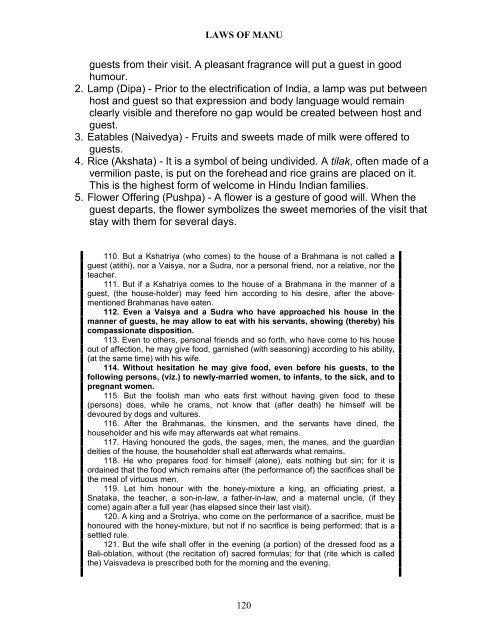Create successful ePaper yourself
Turn your PDF publications into a flip-book with our unique Google optimized e-Paper software.
LAWS OF MANU<br />
guests from their visit. A pleasant fragrance will put a guest in good<br />
humour.<br />
2. Lamp (Dipa) - Prior to the electrification of India, a lamp was put between<br />
host and guest so that expression and body language would remain<br />
clearly visible and therefore no gap would be created between host and<br />
guest.<br />
3. Eatables (Naivedya) - Fruits and sweets made of milk were offered to<br />
guests.<br />
4. Rice (Akshata) - It is a symbol of being undivided. A tilak, often made of a<br />
vermilion paste, is put on the forehead and rice grains are placed on it.<br />
This is the highest form of welcome in Hindu Indian families.<br />
5. Flower Offering (Pushpa) - A flower is a gesture of good will. When the<br />
guest departs, the flower symbolizes the sweet memories of the visit that<br />
stay with them for several days.<br />
110. But a Kshatriya (who comes) to the house of a Brahmana is not called a<br />
guest (atithi), nor a Vaisya, nor a Sudra, nor a personal friend, nor a relative, nor the<br />
teacher.<br />
111. But if a Kshatriya comes to the house of a Brahmana in the manner of a<br />
guest, (the house-holder) may feed him according to his desire, after the abovementioned<br />
Brahmanas have eaten.<br />
112. Even a Vaisya and a Sudra who have approached his house in the<br />
manner of guests, he may allow to eat with his servants, showing (thereby) his<br />
compassionate disposition.<br />
113. Even to others, personal friends and so forth, who have come to his house<br />
out of affection, he may give food, garnished (with seasoning) according to his ability,<br />
(at the same time) with his wife.<br />
114. Without hesitation he may give food, even before his guests, to the<br />
following persons, (viz.) to newly-married women, to infants, to the sick, and to<br />
pregnant women.<br />
115. But the foolish man who eats first without having given food to these<br />
(persons) does, while he crams, not know that (after death) he himself will be<br />
devoured by dogs and vultures.<br />
116. After the Brahmanas, the kinsmen, and the servants have dined, the<br />
householder and his wife may afterwards eat what remains.<br />
117. Having honoured the gods, the sages, men, the manes, and the guardian<br />
deities of the house, the householder shall eat afterwards what remains.<br />
118. He who prepares food for himself (alone), eats nothing but sin; for it is<br />
ordained that the food which remains after (the performance of) the sacrifices shall be<br />
the meal of virtuous men.<br />
119. Let him honour with the honey-mixture a king, an officiating priest, a<br />
Snataka, the teacher, a son-in-law, a father-in-law, and a maternal uncle, (if they<br />
come) again after a full year (has elapsed since their last visit).<br />
120. A king and a Srotriya, who come on the performance of a sacrifice, must be<br />
honoured with the honey-mixture, but not if no sacrifice is being performed; that is a<br />
settled rule.<br />
121. But the wife shall offer in the evening (a portion) of the dressed food as a<br />
Bali-oblation, without (the recitation of) sacred formulas; for that (rite which is called<br />
the) Vaisvadeva is prescribed both for the morning and the evening.<br />
120


















